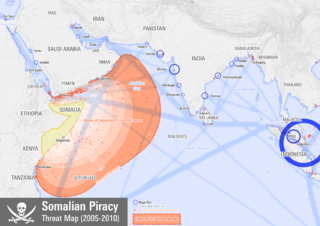Maritime Security Regimes are codes and conventions of behavior agreed upon by coastal states to provide a degree of security within territorial waters and on the high seas.

Piracy in the Gulf of Guinea affects a number of countries in West Africa as well as the wider international community. By 2011, it had become an issue of global concern. Pirates in the Gulf of Guinea are often part of heavily armed criminal enterprises, who employ violent methods to steal oil cargo. In 2012, the International Maritime Bureau, Oceans Beyond Piracy and the Maritime Piracy Humanitarian Response Program reported that the number of vessels attacks by West African pirates had reached a world high, with 966 seafarers attacked during the year. According to the Control Risks Group, pirate attacks in the Gulf of Guinea had by mid-November 2013 maintained a steady level of around 100 attempted hijackings in the year, a close second behind Southeast Asia. Piracy in the Gulf of Guinea continues to be a concern to the shipping industry, which is affected significantly. At the same time, governments in the region generally highlight that the fight against piracy requires a broad understanding of maritime security throughout the Gulf of Guinea.
Piracy off the coast of Somalia occurs in the Gulf of Aden, Guardafui Channel and Somali Sea, in Somali territorial waters and other areas. It was initially a threat to international fishing vessels, expanding to international shipping since the second phase of the Somali Civil War, around 2000.

United Nations Security Council Resolution 1838 is a United Nations Security Council resolution that calls on nations with vessels in the Somali piracy region to apply military force as a means of repressing acts of piracy. Adopted unanimously on October 7, 2008, it recommends that states commit both naval and air forces to fight this crime. The text was drafted by French authorities.

United Nations Security Council resolution 751 is a United Nations Security Council resolution adopted unanimously on April 24, 1992, after reaffirming resolutions 733 (1992) and 746 (1992) and considering a report by the Secretary-General Boutros Boutros-Ghali on the ongoing civil war in Somalia. The Council established a United Nations Operation in Somalia I with an immediate deployment of 50 observers in the capital Mogadishu to monitor the ceasefire.

United Nations Security Council Resolution 1918, adopted unanimously on April 27, 2010, after recalling resolutions 1814 (2008), 1816 (2008), 1838 (2008), 1844 (2008), 1846 (2008), 1851 (2008) and 1897 (2008) on Somalia, the Council called on countries to criminalise piracy within their national laws.

United Nations Security Council Resolution 1950, adopted unanimously on November 23, 2010, after recalling previous resolutions on the situation in Somalia, including resolutions 1814 (2008), 1816 (2008), 1838 (2008), 1844 (2008), 1846 (2008), 1851 (2008), 1897 (2009) and 1918 (2010); the Council re-authorised states to intervene in acts of piracy by Somali pirates at sea for a further period of twelve months.
United Nations Security Council Resolution 1976, adopted unanimously on April 11, 2011, after recalling previous resolutions on the situation in Somalia, particularly resolutions 1918 (2010) and 1950 (2010), the Council decided to consider the establishment of special Somali courts to try pirates operating off the coast of the country.

United Nations Security Council Resolution 1676, adopted unanimously on May 10, 2006, after recalling previous resolutions on the situation in Somalia, particularly resolutions 733 (1992), 1519 (2003), 1558 (2004), 1587 (2005) and 1630 (2006), the Council re-established a group to monitor the arms embargo against the country for a further six months.
United Nations Security Council Resolution 2018 was unanimously adopted on 31 October, 2011.
United Nations Security Council Resolution 2020 was unanimously adopted on 22 November 2011.
United Nations Security Council Resolution 1801 was unanimously adopted on 20 February 2008.
United Nations Security Council Resolution 1897 was unanimously adopted on 30 November 2009.
United Nations Security Council Resolution 1816 was unanimously adopted on 2 June 2008.
United Nations Security Council Resolution 1851 was unanimously adopted on 16 December 2008.
The Contact Group on Piracy off the Coast of Somalia, commonly abbreviated as CGPCS, is an international governance mechanism established in New York on January 14, 2009 to facilitate the discussion and coordination of actions among states and organizations to suppress Somali piracy.

United Nations Security Council Resolution 2077 was unanimously adopted on 21 November 2012. The Security Council renewed for another year the authorizations, first agreed in 2008, for international action to fight the crimes in cooperation with the new Somali Government, whom it requested to create a national legal framework for the effort.

Piracy in Somalia has been a threat to international shipping since the beginning of the country's civil war in the early 1990s. Since 2005, many international organizations have expressed concern over the rise in acts of piracy. Piracy impeded the delivery of shipments and increased shipping expenses, costing an estimated $6.6 to $6.9 billion a year in global trade in 2011 according to Oceans Beyond Piracy (OBP). According to the German Institute for Economic Research (DIW), a veritable industry of profiteers also arose around the piracy. Insurance companies significantly increased their profits from the pirate attacks, as the firms hiked rate premiums in response. Since 2013, piracy attacks have reduced in the region due mostly to patrolling by the navies of countries across the world, especially India, China and EU Navfor Operation Atalanta.
International piracy law is international law that is meant to protect against piracy. It was enacted primarily by the United Nations and UNCLOS, and defines different types of piracy and ways to combat it.







